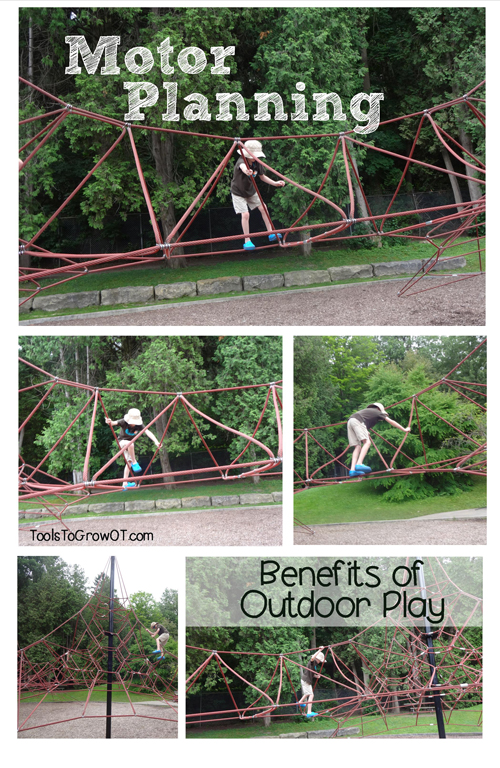Outdoor Play & Praxis
07.10.2014
The occupation of children is play, and the benefits of playing outdoors and developing praxis are many!! It is officially summer vacation and we have been spending lots of time outside! Watching my 6 year old son climb and navigate through this net structure at a playground allowed for a great visual of praxis! As he climbed up and moved across the net structure he had to conceive, plan, sequence, and carry out this skilled (and fun!) process. Throughout this task he used many skills, including bilateral coordination, problem solving, and self-exploration; while having a good sense of where his body was in space (body awareness).

As Occupational Therapists (and parents!) we understand how important it is for children to regularly participate in outdoor play. This blog will focus on how to help children develop praxis while having fun outdoors. Praxis is often referred to as motor planning, but as you will soon read and find out, it involves much more than just that!
Praxis is Latin for 'doing, acting' … it is the ability to interact successfully with the physical environment. It is a broad term, which is a complex, multi-step process involving both a cognitive component and a motor component. Praxis is what allows children to organize, plan, and execute motor skills in a refined and efficient manner. One aspect of praxis involves a child’s ability to imitate. Occupational therapists are experts at dissecting tasks into small steps for demonstration and easier imitation by children. However, don’t forget to remind parents and caregivers to do the same when involving their child in unfamiliar outdoor activities.
Ideation is the aspect of praxis that allows the child to see the possibilities in their environment and organize their motor response accordingly. Not every child will use a log “to walk the plank”, roll in the grass like a “caterpillar”, or jump from stone to stone like a “frog”. The child may need direct support and guidance to generate such ideas. Encourage the child to verbalize their ideas about how they want to start (initiate) the task, and then facilitate the corresponding motor response. Assistance from an adult or older child may be essential when a child with weak praxis is involved in outdoor construction. Guide the child to use objects and materials in new and different ways for activities such as building a fort or creating a makeshift soccer field.
Children require considerable repetition to master new motor skills until their performance becomes automatic. This is an important point that is worth reminding parents as they organize their child’s daily routine and the time allotted for outdoor play. Once a skill is achieved, advise parents to gradually introduce novelty. A child may improve his or her feed-forward, timing, and grading with simple modifications. For example, when tossing a ball back and forth the parent may opt to use a smaller/larger ball, use a heavier/lighter ball, throw the ball faster/slower, or increase/decrease the distance the ball is tossed. Finally, when engaged in a sequenced task, encourage the child to “talk himself through it”. If speech and language difficulties compromise this, help by doing the talking for them.
There are many benefits of outdoor exploration and developing praxis. Providing the child with numerous opportunities for play allows for the development of ideation, motor planning, execution, and reflection on task for future play endeavors. Every child is unique in their ability to complete motor planning tasks. Remember to allow for sufficient time and repetition of skills. Remember that "Children need the freedom and time to play. Play is not a luxury. Play is a necessity." Kay Redfield Jamison (Contemporary American professor of psychiatry).
Find our Motor Planning resources here.
Related Topics: Gross Motor, Praxis/Motor Planning , Summer


